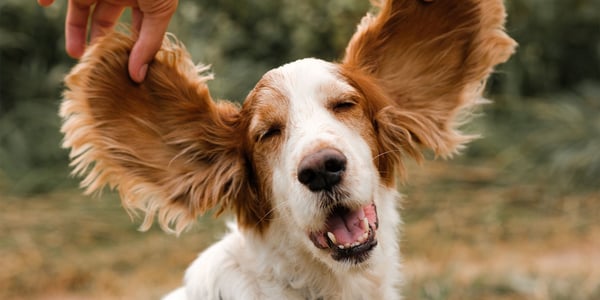Cocker Spaniel Ear Care: How to Clean Cocker Spaniel Ears
Index:



Introduction
Cocker Spaniels are amongst the most popular breeds in the UK, known for their gentle temperament and distinctive floppy ears.
Unfortunately, these adorable ears can also make them more susceptible to ear infections. That's why it's essential to understand the importance of ear care for Cocker Spaniels and learn how to clean their ears properly.
In this article, we'll discuss everything you need to know about cleaning your Cocker Spaniel's ears. We will also be highlighting health concerns such as the chance of infection with long-eared breeds.
In typical Waggel style, the helpful information doesn't end there. We've also prepared a complete guide to the other popular Spaniel breeds in our piece here. In this post, we discuss the top 15 types of Spaniels with some adorable pictures sprinkled in for added measure.
Why Cocker Spaniels are prone to ear infections
The anatomy of a Cocker Spaniel's ear is quite different from that of breeds with erect ears, like German Shepherds or Huskies. Their long, floppy ears create a warm, moist environment that can be a perfect breeding ground for bacteria, yeast, and other organisms.
This environment can lead to the development of ear infections, also known as otitis externa.
Additionally, Cocker Spaniels have a narrow ear canal, which can further trap moisture and debris, leading to irritation and inflammation.
A lack of proper air circulation also contributes to this issue. Therefore, it's crucial to maintain a regular ear cleaning schedule for your Cocker Spaniel to reduce the risk of infection.



Understanding your Cocker Spaniel's ears
Anatomy of the Cocker Spaniel's ear
A Cocker Spaniel's ear is composed of three main parts: the external ear, the middle ear, and the inner ear. The external ear includes the long, floppy ear flap and the ear canal, which leads to the middle ear. The middle ear contains the eardrum, or tympanic membrane, and the inner ear is responsible for hearing and balance.
Differences between floppy and erect ears
The main difference between floppy and erect ears is the amount of airflow and circulation within the ear. Erect ears allow for better air circulation, which helps keep the ear canal dry and clean. In contrast, floppy ears like those of Cocker Spaniels trap moisture and debris, making them more prone to infection.
Common ear problems in Cocker Spaniels
Some common ear problems in Cocker Spaniels include:
1. Ear infections: Bacterial or yeast infections are common in Cocker Spaniels due to their ear anatomy.
2. Ear mites: These tiny parasites can cause irritation and inflammation within the ear canal. Learn more about ear mites in dogs here.
3. Allergies: Cocker Spaniels may develop ear infections as a result of allergic skin conditions.
Signs of ear infections in Cocker Spaniels
Identifying signs of an ear infection in your Cocker Spaniel is crucial for early detection and treatment.
Some common signs include:
Foul smell or discharge from the ear
Redness or swelling of the ear canal or flap
Head shaking or scratching at the ear
Pain or sensitivity when the ear is touched
If you notice any of these signs, it's essential to consult your veterinarian for a proper diagnosis and treatment plan.



Steps to clean your Cocker Spaniel's ears
Preparing the cleaning solution
Choose a proper ear-cleaning solution specifically designed for dogs. Avoid using hydrogen peroxide, as it can be too harsh for your dog's ears. Consult your vet for recommendations on the best solution for your Cocker Spaniel.
What tools you need
To clean your Cocker Spaniel's ears, you'll need:
1. Dog-specific ear-cleaning solution
2. Cotton balls or cotton wool pads
3. Cotton buds (only for cleaning the outer ear, never insert into the ear canal)
4. A towel or cloth to clean up any mess
How to restrain your dog
Before beginning the ear cleaning process, ensure your dog is comfortable and secure. You can either have your dog sit on your lap or ask someone to help hold your dog still.
Step-by-step cleaning instructions
It is always important to ask your veterinarian which products are best for your dog and always be sure to follow the directions on any product you buy for your dog's ears. Below is a general guide for cleaning your Cocker Spaniel's ears:
1. Gently lift the ear flap and squeeze in your ear-cleaning solution into the ear canal. You may hear a sound as the solution breaks down any build-up.
2. Gently massage the base of the ear for about 30 seconds to help the cleaning solution break up any further debris inside the ear canal.
3. Allow your dog to shake its head, which will help remove excess solution and debris.
4. Use a clean, dry cotton ball or cotton wool pad to wipe away any remaining debris and solution from the outer ear.
5. Repeat this process on the other ear.
Tips for preventing ear infections in Cocker Spaniels
1. Keep your Cocker Spaniel's ears clean and dry by performing regular ear cleaning.
2. Groom your Cocker Spaniel's ears regularly, including trimming excess hair. Learn more about how to groom a Cocker Spaniel here.
3. Dry your dog's ears thoroughly after swimming or bathing.
4. Avoid irritants, such as harsh ear-cleaning solutions or allergens.
Medical treatments for ear infections in Cocker Spaniels
If your Cocker Spaniel develops an ear infection, consult your veterinarian for a proper diagnosis and treatment plan. Treatment may include:
Antibiotics, antifungal medications, or anti-inflammatory drugs
Ear drops or ointments to soothe and treat the infection
In severe cases, surgery may be necessary to address chronic inflammation or other complications
Always follow your veterinarian's advice and never attempt to treat an ear infection without professional guidance.
As a Waggel member, you can get unlimited 24/7 access to online video vet consultations with Joii. Simply log into your account to find out more!
Understanding ear infections in Cocker Spaniel puppies
Cocker Spaniel puppies are more prone to ear infections due to their developing immune systems and a lack of familiarity with ear care routines. Symptoms of ear infections in puppies are similar to those in adult dogs. If you suspect your puppy has an ear infection, consult your veterinarian immediately.
To clean a puppy's ears, follow the same steps as for adult dogs but be extra gentle and cautious.



Tips for maintaining your Cocker Spaniel's ear health
1. Clean your Cocker Spaniel's ears on a regular basis, as recommended by your veterinarian.
2. Regularly groom your Cocker Spaniel to keep their ears clean and free of excess hair.
3. Monitor your dog's diet and overall health, as some dietary factors can contribute to ear infections.
4. Consult your veterinarian if you notice any signs of an ear infection or if your dog is experiencing discomfort.
Possible complications of untreated ear infections
Untreated ear infections can lead to chronic inflammation, permanent damage to the ear canal, or even hearing loss.
To avoid complications, ensure you maintain a regular ear cleaning schedule and consult your veterinarian if you suspect an infection or notice any changes in your dog's ear health.
Ear infections in Cocker Spaniels and allergies
Allergies can be a contributing factor to ear infections in Cocker Spaniels. Allergic reactions to environmental factors, food, or other substances can cause inflammation in the ear canal, making it more susceptible to infection.
If you suspect your Cocker Spaniel has allergies, consult your veterinarian to determine the cause and develop an appropriate treatment plan.
Best ear cleaning products for Cocker Spaniels
There are various ear-cleaning products available for Cocker Spaniels, and choosing the right one for your dog is essential. Some popular types of ear cleaners include liquid solutions, wipes, and gels as below.
Always consult your veterinarian for recommendations on the best ear-cleaning products for your Cocker Spaniel. Keep in mind that individual dogs may have different needs and sensitivities.
If you're a Waggel member, you can ask all your health-related questions to your very own video vet via Joii. This is a free service however if you are not a Waggel member, the consultation costs are priced at £28 each.
Conclusion
Cocker Spaniel ear care is crucial for maintaining the health and happiness of your furry companion. By following a regular ear cleaning schedule, being vigilant for signs of infection, and consulting your veterinarian when necessary, you can help keep your Cocker Spaniel's ears clean and infection-free.
Happy cleaning!
FAQs
How often should I clean my Cocker Spaniel's ears?
The frequency of ear cleaning varies depending on your dog's individual needs. Consult your veterinarian for a personalised recommendation.
Can I use human ear cleaning products on my Cocker Spaniel?
No, human ear cleaning products may be too harsh for your dog's ears. Always use dog-specific ear-cleaning solutions.
How can I tell if my Cocker Spaniel has an ear infection?
Look for signs such as foul smell, discharge, redness, swelling, or discomfort in the ear area. If you suspect an infection, consult your veterinarian.
Is it necessary to take my Cocker Spaniel to the vet for ear cleaning?
Regular ear cleaning can typically be done at home. However, if your dog is experiencing discomfort, has a history of ear infections, or if you're unsure about the proper cleaning technique, it's best to consult your veterinarian.
Waggel Pet Insurance
Need more help? You're in luck if you're a Waggel Pet Insurance member. Along with our excellent coverage, we offer access to a 24/7 online vet to answer all your sticky questions, especially if you need grooming assistance.
Not a member? Why not get a quote now and cover your furry friend for a range of illnesses, all while enjoying our amazing perks and rewards.
Want more like this?
Get updates from us with helpful info, advice, answers to frequently asked questions and much more.
Index:
- Introduction
- Why Cocker Spaniels are prone to ear infections
- Understanding your Cocker Spaniel's ears
- Common ear problems in Cocker Spaniels
- Signs of ear infections in Cocker Spaniels
- Steps to clean your Cocker Spaniel's ears
- Medical treatments for ear infections in Cocker Spaniels
- Understanding ear infections in Cocker Spaniel puppies
- Tips for maintaining your Cocker Spaniel's ear health
- Possible complications of untreated ear infections
- Ear infections in Cocker Spaniels and allergies
- Best ear cleaning products for Cocker Spaniels
- Conclusion
- FAQs
Related posts:
Get your quote
Along with our excellent coverage, we offer access to a 24/7 online vet to answer all your sticky questions.





